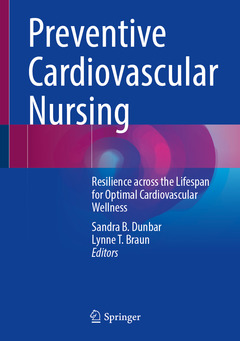Preventive Cardiovascular Nursing, 1st ed. 2024 Resilience across the Lifespan for Optimal Cardiovascular Wellness
Coordonnateurs : Dunbar Sandra B., Braun Lynne T.

This book provides a comprehensive overview of essential concepts and evidence that guide the practice of contemporary preventive cardiovascular nursing. The sections incorporate a lifespan approach to cardiovascular wellness, and provide perspectives on sources of known and emerging cardiovascular risk factors as well as the spectrum of multidimensional factors including biological, behavioral, psychological and sociocultural influences on cardiovascular wellness, risk, and the evolution of cardiovascular conditions.
Unique features address: 1) building resilience across the lifespan such that optimal cardiovascular wellness can be attained within multiple contexts of health states to increase a healthy lifespan and longevity; 2) behavior change skills for risk factor reduction; 3) risk factors and risk reduction approaches with special populations defined by gender, , age and aging, heath states, and health equity issues; and 4) high level roles for cardiovascular nurses as provider - risk assessor, communicator and care provider; educator, leader, patient and health advocate. Relevant case studies are included throughout to facilitate the application of the content.
This book fills a gap in that there is no other book on preventive cardiovascular nursing care and roles , and it provides support for the nurse to lead relevant interdisciplinary teams. The book will empower nurses to build knowledge and skills for cardiovascular prevention and to provide leadership for optimal cardiovascular wellness for patients and communities.
Sandra B. Dunbar, RN, PhD is the Charles Howard Candler Professor Emerita of Cardiovascular Nursing and former Senior Associate Dean of Academic Advancement. in the Nell Hodgson Woodruff School of Nursing. and adjunct professor in the School of Medicine, Emory University, Atlanta, GA. She has focused her program of research on improving outcomes for complex cardiovascular patients and their families and with interdisciplinary colleagues, she has led NIH, AHA and other funded clinical trials that developed and tested interventions to improve self-care and quality of life, reduce cardiovascular risk and psychosocial distress in both CV patients and their family caregivers, and create cost-effective approaches that reduce health resource use. She has successfully mentored doctoral students, postdoctoral trainees, and junior faculty, and has served as the Director of a T32 on Improving outcomes in Chronic Conditions, and served as the Training Director for the AHA funded SFRN Emory-Morehouse Center for Cardiovascular Health Disparities (MECA). Her leadership spans multiple professional nursing and interdisciplinary organizations in that she has served as Chair of the Council of Cardiovascular and Stroke Nursing of the American Heart Association (AHA), chair of the Nursing Council of the Heart Failure Society of America, President of the American Association of Critical Care Nurses, and President of the Preventive Cardiovascular Nursing Association. She is an elected fellow in the AHA, the American Academy of Nursing, and PCNA. She has published widely in nursing and interdisciplinary journals and has presented her work including topics of prevention at local, national, and international scientific meetings.
Lynne T. Braun, PhD is Professor Emerita in the Department of Adult Health and Gerontological Nursing, Rush University College of Nursing. For over 22 years, she practiced as a nurse practitioner in the Rush Heart Center for Women wh
Date de parution : 05-2024
Ouvrage de 708 p.
17.8x25.4 cm



